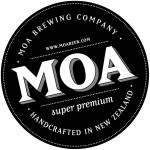We were misled, let down – Moa boss Geoff Ross on sales miss
Moa boss Geoff Ross says there’s nothing wrong with the Kiwi appetite for craft beer and it’s not customers that have let the company down in relation to its recent sales warning – and subsequent share price crash.

While he says the beer remains popular in bars and pubs, where 20% of its sales are made, it was outgoing distributors Treasury Wine Estates (NZ) that informed Moa late last week it couldn’t deliver on its sales and distribution strategy.
Now, four months into the 2014 financial year, Moa expects to miss its full-year target of 195,000 cases by 30% largely due to a shortfall in the New Zealand market.
That was despite strong assurances the strategy would work, Mr Ross says.
“They led us to believe they understood the market, but that has not been the case.”
“As
The distribution agreement was reported to have given Moa access to more than 2000 retail accounts nationally.
A year ago, Mr Ross told Idealog magazine Treasury Estate Wine’s reach and scale in teh industry, coupled with their committment to premium products made them the perfect partner to “supercharge growth” of Moa’s brand.
“TWE’s distribution centres represent a much easier route to market and with their back-office support, we can concentrate our efforts on what we do best – brewing exceptional craft beer, building the Moa brand and opening up international markets,” he told Idealog.
Today, Mr Ross said a new distribution model now being negotiated will see Moa work more closely with customers itself, Mr Ross says.
Having fallen as low as 80c today, following the sales downgrade, shares in Moahave recovered ground to $94c – down 31c on last year’s listing price.
ForBarr downgrades to sell
Forsyth Barr has downgraded its target price for Moa shares to $0.99 and its recommendation from hold to sell.
“Moa’s value lies in its ability to grow volumes in its key export markets, particularly the USA” Forsyth Barr says in a research note.
“While Moa is in its early growth stages, domestic volumes are expected to underpin revenues and are a significant factor in the timing of break-even. Uncertainty around domestic volume growth and the fact Moa is now trading at a premium to our assessed value has led us to downgrade to sell.”
Asked about the hit to the share price, Mr Ross says he believes Moa can regain momentum and faith in the brand and business.
“In the early days of an export-led business, New Zealand is a meaningful share of the market, so changes here are material,” he says.
Is the craft beer market too crowded?
“You could have said the same thing about wine 20-30 years ago, but there’s been fantastic success stories within that industry,” Mr Ross says.
Although there were a lot of craft beer players, many were set up as small “ma and pa-type businesses”, he says.
“There’s a small number of us with bigger business ambitions. Not all of them will take a growth and export strategy like we are.
“New Zealanders are loving craft beer, it’s a fast-growing category.”
New brewery at least a year away
The boutique beer maker raised $16 million in last year’s November float – $15 million from institutional investors and $1 million from the public – to pay for a new brewing facility.
Consents to build a larger brewery for $6.1 million on the current site in Marlborough was granted by the Marlborough District Council last week.
Mr Ross told NBR ONLINE construction of the new brewery is at least one year away.
In the meantime, Moa is looking at contract brewing options to cover capacity requirements.
Earlier this year, Moa cracked its 10th offshore market – Canada
The biggest export market is US which Moa says is at the forefront of craft beer. It also exports to China, Brazil, Australia, Finland, Cambodia, Vietnam, Singapore and the UK.
Moa’s November listing gave New Zealand a locally listed brewer for the fist time since Lion delisted in 2009, when it was brought by Japanese brewer Kirin.
At the time of listing, Moa general manager Gareth Hughes said sales of many mainstream beer brands were in decline and craft brewing was the growth segment of the market as Kiwi beer drinkers were becoming more sophisticated.
